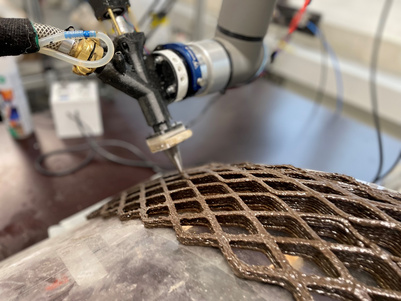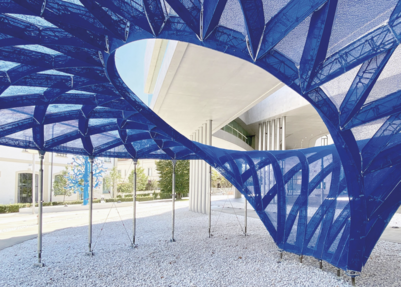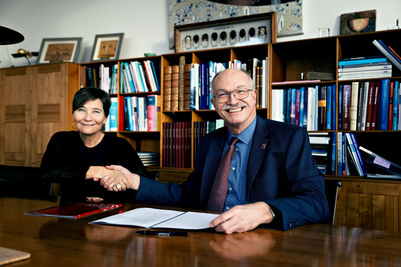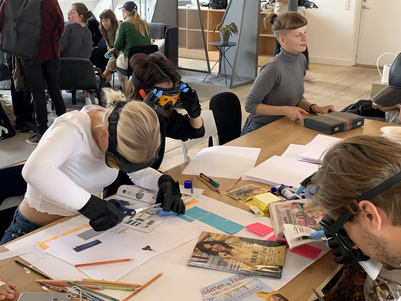KADK setting up a sustainable base in Marocco
Towards the end of 2008, the Royal Danish Academy of Fine Arts School of Design launched a project in collaboration with the Moroccan women’s handicraft co-operative Reseau Femmes Artisanes. Six years on, the first group of Moroccan women have now completed the programme. During the course, the women have learned about design development and business management, and have delved deep into Moroccan cultural heritage. And not least, the course has also broken down cultural prejudices and given the women a new sense of independence.

The article is written by Kvinfo
Bracelets entwined in soft-coloured sabra silks, mauve pillows with embroidered edges, shoulder bags with embellished buttons. These simple and beautifully produced products are displayed on pine shelves with a naked wall as a backdrop. It could be mistaken for being a little slice of Scandinavia, but the heat, the colours, the sounds of the bustling souk outside, and the smell of the piping-hot mint tea sitting on the large workbench tells us that we are in fact in the middle of the medina in Marrakesh.
This tall, narrow house is the home of Reseau Femmes Artisanes – a co-operative of Moroccan craftswomen. Behind it is a classical Moroccan shaded courtyard or riad. However, this is not the home of a multi-generation family. Within the cool walls are workshops with women busily embroidering and sewing on large industrial machines.
Since 2008, Reseau Femmes Artisanes has been collaborating with the School of Design at the Royal Danish Academy of Fine Arts (KADK) on a project aimed at developing handcrafted Moroccan products for the international market. The idea behind the project came from Grethe Weber at KADK. She contacted KVINFO, who in turn drew upon its extensive network of contacts within Moroccan civil organisations to identify Reseau Femmes Artisanes as a suitable project partner. As well as having played an ongoing role in facilitating the project, KVINFO has also provided financial backing through its involvement in the Danish Foreign Ministry-backed Danish-Arab Partnership Programme.
Using the original classical designs and traditions of the Moroccan women as their basis, the Danish design students – in partnership with the Moroccan women – have developed new products that maintain a focus on materials and decorations and that will also appeal to consumers outside morocco.
For their part, the Danish students have gained first-hand knowledge of working within an international market. And because most clothing today is produced outside Europe, this knowledge gained by the students can be put to good use when they later go on to work for international clothing manufacturers or designers, or end up establishing themselves as independent designers.
For both sides of the partnership, the long duration of the programme has been a significant and important aspect of the project. The long time span made it possible to establish a sustainable business strategy, and meant that any cultural misgivings either side may have had could be addressed and swept aside. So successful has the partnership been that Reseau Femmes Artisanes was awarded the prize for best handcrafted products at the Riad Art Expo held in Marrakech in 2012.
Simpler products
Saida Cha’abouni is the daily manager of Reseau Femmes Artisanes in Morocco. She tells about the first five years of the collaboration.
However, it’s not only the designs that are being enhanced by the international collaboration. In male-dominated and traditionally family-based Morocco, the fact that the women can contribute to the family’s economy means a great deal for the women’s status. Saida Cha’abouni explains that during the course of the programme women become more independent and take on a new outlook towards life.
Shared tradition for handicrafts
Scattered about Reseau Femmes Artisanes’s showroom are numerous charcoal-grey cushions embroidered with asymmetrical designs resembling black branches extending over a dark Danish winter’s sky. Saida Cha’abouni laughs when I pick one of these up.
“All the Danish women who come here want to buy those”, she smiles, and goes on to reveal that those particular cushions are not even a product of the design collaboration.
Saida Cha’abouni has been to Copenhagen three times during the course of the project. Through these visits, she has noticed that there are many similarities between the Danish and the Moroccan design traditions, both of which draw heavily from the colours, materials and motifs found in nature. The only difference she sees is that the two countries have different landscapes. “And different climates”, she adds with a shudder.
The course as a design project in itself
Both Saida Cha’abouni and the women who are about to complete the first full education programme now understand the principles of product development and design. But the course itself has also been a design process undergoing constant development.
Upon the completion of the next part of the course, which focuses on the business and commercial side of production, the first group of women will formally have completed the whole programme. Saida Cha’abouni, however, sees this merely as the beginning of a new phase in the collaboration as it is here that the women’s competencies will be put to the test for the first time.
“We’re now looking for new groups and co-operatives of women to put through the same programme. The first group will be charged with training the second group and so on. They can pass on everything that they’ve learned from the Design School. And together with the Design School, we’ve just begun working together with a group of women in Tunisia on a project identical to ours” tells Saida Cha’abouni.
The idea behind the Tunisian project is that the Moroccan women will act as mentors and role models for the Tunisian women. They will be 100% responsible for the course, and the only support provided from Denmark will be financial. The first part of the course will be a joint blog project, and the women will also work on finding a model that will enable them to trade and market each other’s products.
It takes time to establish a well-functioning partnership
In Copenhagen, Grethe Weber – the Danish co-ordinator of the project and project manager at KADK – emphasises the fundamental importance of the Moroccan women rediscovering a pride in their own craftswomanship. When the project started off five years ago, the Moroccan women thought that they would be asked to produce goods akin to those they saw in French lifestyle magazines. To prove that this was not necessary, the Danish and Moroccan women invested a great deal of time in jointly delving into traditional Moroccan culture.
Grethe Weber has past experience from other partnership projects that ran over a shorter period of time. Her experience is that shorter-term projects are usually more vulnerable and fragile.
“Previous projects have shown that if you don’t set aside enough time for the small company to gain a solid foothold socially, culturally and economically then the project collapses the minute the foreign partner pulls out. It’s important for the sustainability of the project that those working in it are themselves capable of standing on their own two feet in all areas.”
Breaking through the ‘wall’
Often, unforeseen circumstances can take time to resolve. At the beginning of this project, Grethe Weber was keen for the women to establish a VAT-registered company. This is something that in Denmark can be achieved with a few mouse clicks and takes no longer than an hour or two. Yet in Morocco, a country that has inherited a labyrinthine tax and VAT system from its previous French colonial rulers, the VAT registration process can take several years – not least if you are a woman who has no start-up capital or who owns no property. So this is a hurdle that Grethe Weber now respects.
The next hurdle is how to bring the skills, competencies and work of Reseau Femmes Artisanes to the attention of the wider public. Grethe Weber hopes to establish a co-operation between Reseau Femmes Artisanes and a local design school in Marrakech. The aim is to bring the resources of the local women to the attention of the major – often-French – architectural and interior design companies. But first a ‘wall’ of cultural prejudice, as she calls it, must be broken down.
Like Saida Cha’abouni, Grethe Weber is keen to see the work and competencies of the women setting off a ripple effect.





